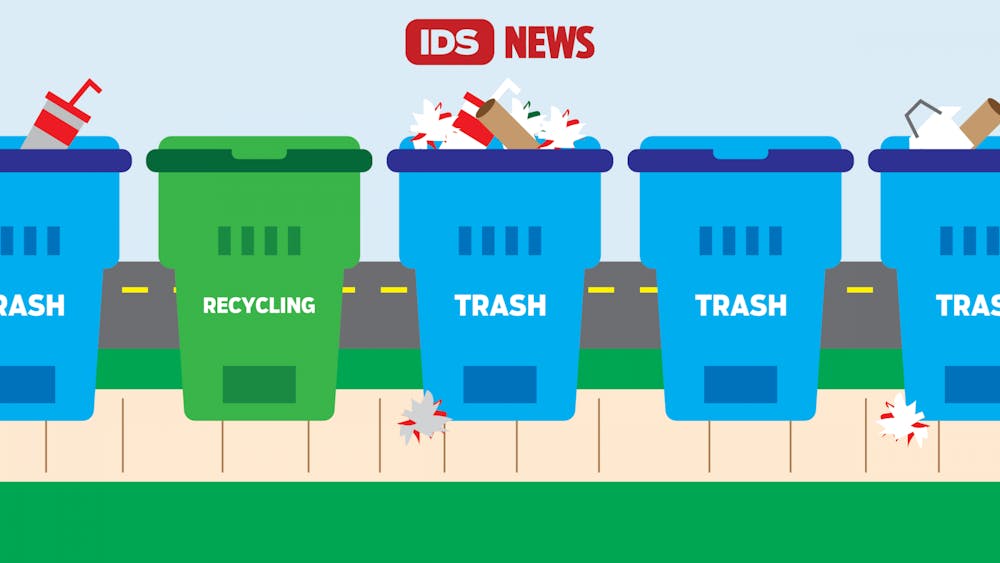The ongoing COVID-19 pandemic has had far-reaching effects, including in environmental sustainability. Initial reactions internationally ranged from joy that air quality was dramatically improving in many cities, to concerns that fear of viral spread would cause the collapse of public transportation systems. In Bloomington, organizations from grocery stores to bicycling advocacy groups to the city public works department have been affected.
Adam Wason, director of the Bloomington Public Works Department, said the sanitation division collected over 100 more tons of household trash in March 2020 than in March 2019, and about 82 tons more in April. In contrast, in January the division picked up less trash than in 2019, before the pandemic shut down many workplaces.
At the same time, there was an initial surge in recycling. In March 2020 they collected nearly 82 tons more recycling than in 2019, but by April, the trend had reversed, and they picked up 3 tons less than 2019.
While it may be that this increase is coming from people throwing things away at home instead of at work or school, the impact on the public works department is huge, Wason said.
Each ton of recycling or trash costs about $43 to have processed, so the 100.56 extra tons of garbage collected in March alone added approximately $4,324.08 to the department’s expenses, an unforeseen impact that Wason said has resulted in cuts to supplies and the cancellation of capital improvement projects.
Policy changes at local grocery stores and an increase in take-out food consumption have also contributed to the uptick in trash, as everything from reusable cups at coffee shops to the dishes people eat with at restaurants were replaced with plastic and styrofoam versions. Nicholas Blewett, Bloomingfoods’ manager of marketing, communications and engagement, said that while sustainability is an important part of the co-op, the pandemic had forced them to package their bulk food section into plastic bags and encourage customers not to bring in their own grocery bags.
“We’re just trying to mitigate the amount of stuff that comes from outside the store inside the store, from the standpoint of protecting the staff,” he said.
Other protective measures have also contributed to the increase in waste, such as an increase in cleaning, leading to more paper and cleaning products being used and thrown away. Blewett noted that the masks they provided to staff were machine-washable, and therefore do not add to their overall trash output.
Wason added that he has seen a bit of an uptick in littering and paper masks on the streets, but it has also been easier to clean the streets because there are fewer cars on the roads, Wason said.
Jakob Breunig, a shop monitor with the Community Bike Project, said he has also noticed a decrease in the number of cars on the roads. He said the layoffs and reduced hours that many working people experienced as the state locked down have made maintaining and driving cars too expensive for some of the project’s clients, so they are looking at bicycles instead.
The project is funded and supplied by donations, both monetary and in the form of bikes. Breunig said that they have seen an increase in donations of interesting old bikes this spring, as people take the extra time at home they have to clean out their houses.
“We can take what’s essentially trash and turn it into autonomous transportation,” he said.
While bicycles are often associated with ecological sustainability, Breunig added that the Community Bike Project is also committed to the social justice aspect of bicycling, as a form of “autonomous and environmentally-friendly” transport, a role that has become more important as the impacts of COVID-19 continue to spread.
The pandemic came right before Bloomingfoods was planning on beginning a month-long sustainability festival, Blewett said. The festival was scheduled to run from Earth day on April 22 to fair Trade Day on May 10. While COVID-19 has hampered their efforts, he added that some events transitioned online, including an Earth Day talk by IU chemistry professor Nikki Pohl. Pohl discussed how she maintains zero-waste activities in her own household in the midst of a pandemic.
Bloomingfoods' Ends statement says they aim to provide education on the interconnectedness of food, health and the environment, and the pandemic has provided new challenges and opportunities for companies working to benefit the Bloomington community.
This community support goes in both directions, Breunig said.
"It's been nice to see the Bloomington community to come out and support us," he said.




